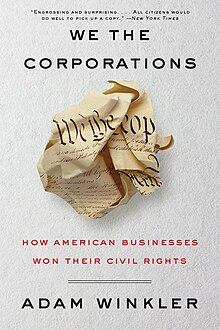Adam Winkler
This articlecontainspromotional content.(July 2021) |
Adam Winkler | |
|---|---|
 Adam Winkler | |
| Born | July 25, 1967 Los Angeles,U.S. |
| Education | Georgetown University(BS) New York University(JD) University of California Los Angeles(MA) |
| Occupation(s) | Attorney Law professor |
| Parent | Irwin Winkler |
| Website | Official website |
Adam Winkler(born July 25, 1967) is the Connell Professor of Law at theUCLA School of Law.He is the author ofWe the Corporations: How American Businesses Won Their Civil Rights[1]andGunfight: The Battle over the Right to Bear Arms in America.[2]His work has frequently been cited in judicial opinions, including inSupreme Courtcases pertaining to theFirstandSecond Amendments.[3]
Early life and education
[edit]Winkler, born and raised inLos Angeles,is the youngest son of film producerIrwin Winkler.As a child, he had small acting parts in movies, includingMartin Scorsese'sNew York, New York(1977).
He holds aBachelor of Sciencein foreign service fromEdmund A. Walsh School of Foreign Service,aJuris DoctorfromNew York University School of Law,and amaster's degreeinpolitical sciencefromUCLA,where he studied underKaren Orren.[4]
Professional career
[edit]Winkler practiced withHoward Weitzmanand representedMichael Jacksonin his defense against charges ofsexual assault.[5]He also served as alaw clerkto judgeDavid Thompsonof theU.S. Court of Appeals for the Ninth Circuitfrom 1995 to 1996.
Winkler was theJohn M. Olinfellow at theUniversity of Southern California Law Schoolfrom 2001 to 2002. He has taught atUCLA School of Lawsince 2002, receiving tenure in 2007.[5]
Scholarship
[edit]
Winkler's bookWe the Corporations: How American Businesses Won Their Civil Rights[1]was a finalist for the2018 National Book Award for Nonfiction,theNational Book Critics Circle Award,theAmerican Bar Association's Silver Gavel Award,theCalifornia Book Award,and received theScribes Book Award.The book chronicles the corporate rights movement: the two-hundred year effort by business corporations to achieve the same constitutional rights as ordinary people, culminating in the Supreme Court's ruling inCitizens United v. FEC.[1]We the Corporationswas listed as a Best or Notable Book of 2018 by the New York Times,[6]the Washington Post,[7]the Economist,[8]the San Francisco Chronicle,[9]and the Seattle Times.[10]
Winkler's writing on theright to bear arms,which recognizes both the individual right to possess firearms and the legitimacy of effective gun control, has been cited by theU.S. Supreme Courtand numerous lower courts.[11]His bookGunfight: The Battle over the Right to Bear Arms in Americadetails the history of the right to bear arms and efforts to balance gun rights with gun safety laws in the United States since the country's founding.[12]
Winkler has written extensively on legal history topics, such as the origins ofcampaign finance law,[13]thewomen's suffrage movement,[14]and the regulation ofpolitical parties.[15]He has also donequantitative researchonconstitutional lawissues, including a study which challenged the legal maxim thatstrict scrutinyis "'strict' in theory, but fatal in fact," finding that federal courts upheld laws when applying the test in approximately 25% of cases.[16][17][18]Along with historianLeonard Levyand UCLA School of Law professorKenneth Karst,Winkler edited the six-volumeEncyclopedia of the American Constitution.[19]
Awards and honors
[edit]Winkler has won awards and honors for his work including theScribes Book Award.His bookWe the Corporationsalso made him a finalist for the2018 National Book Award for Nonfiction,theNational Book Critics Circle Award,theAmerican Bar Association's Silver Gavel Award,theCalifornia Book Award.[20]In 2018, hisalma mater,NYU,awarded him its Law Teaching Award, which is given to teachers for their scholarship and dedication to the education and training of law students.[21]Winkler also currently serves on the board of directors at theBrennan Centerfor Justice.[2]
References
[edit]- ^abc"We the Corporations".wwnorton.com.Retrieved2023-02-02.
- ^ab"Winkler, Adam | UCLA Law".law.ucla.edu.Retrieved2020-11-21.
- ^Farris, Nick; Aggerbeck, Valerie; McNevin, Megan;Sisk, Gregory C.(2016-08-18)."Judicial Impact of Law School Faculties".Rochester, NY.SSRN2826048.
{{cite journal}}:Cite journal requires|journal=(help) - ^"Adam David Winkler".IMDB.Retrieved30 June2017.
- ^ab"Faculty Profiles > Full-Time Faculty > Adam Winkler"Archived2014-05-07 at theWayback Machine.UCLA School of Law.
- ^"100 Notable Books of 2018".The New York Times.19 November 2018.Retrieved2023-02-12.
- ^"100 Notable Books of 2018".yearendlists.com.13 November 2018.Retrieved2023-02-12.
- ^"The Economist's books of the year".The Economist.Retrieved2023-02-12.
- ^"Year in review: The best books of 2018".datebook.sfchronicle.com.Retrieved2023-02-12.
- ^"50 best nonfiction books of 2018".seattletimes.com.7 December 2018.Retrieved2023-02-12.
- ^District of Columbia v. Heller,554 U.S. 570, 691 (2008) (Breyer, J., dissenting);McDonald v. Chicago,561 U.S. 742, 900 (2010) (Breyer, J., dissenting);U.S. v. Yancey,621 F.3d 681, 685 (2010);U.S. v. McCane,573 F.3d 1037, 1048 (2009);Wilson v. State,207 P.3d 565, 585 (2009).
- ^"Gunfight".wwnorton.com.Retrieved2020-11-21.
- ^Adam Winkler,"Other People's Money": Corporations, Agency Costs, and Campaign Finance Law,92 Geo. L.J. 871 (2004)
- ^Adam Winkler,A Revolution Too Soon: Woman Suffragists and the "Living Constitution",76 N.Y.U. L. Rev. 1456 (2001).
- ^Adam Winkler,Voters' Rights and Parties' Wrongs: Early Political Party Regulation in the State Courts, 1886-1915,100 Colum. L. Rev. 873 (2000).
- ^Winkler's article has been cited over 300 times by works in numerous prestigious journals, including Harvard Law Review, Yale Law Journal, and Stanford Law Review to name a few. See, e.g., Richard H. Fallon, Jr.,Constitutionally Forbidden Legislative Intent,130 Harv. L. Rev. 523, 576 (2016); Abbe R. Gluck,Intersystemic Statutory Interpretation: Methodology as Law and the Erie Doctrine,120 Yale L.J. 1898, 1957 (2011); Ian F. Haney Lopez,"A Nation of Minorities": Race, Ethnicity, and Reactionary Colorblindness,59 Stan. L. Rev. 985, 988 (2007).
- ^Adam Winkler,Fatal in Theory and Strict in Fact: An Empirical Analysis of Strict Scrutiny in the Federal Courts,59 Vand. L. Rev. 793 (2006).
- ^Adam Winkler,Free Speech Federalism,108 Mich. L. Rev. 153 (2009).
- ^Encyclopedia of the American Constitution(Leonard W. Levy et al. eds., 2d ed. 2000).
- ^"Winkler, Adam | UCLA Law".law.ucla.edu.Retrieved2021-01-26.
- ^"NYU Law welcomed alumni back to campus for Reunion 2018 | NYU School of Law".www.law.nyu.edu.Retrieved2020-11-21.
External links
[edit]- 1967 births
- Living people
- UCLA School of Law faculty
- American scholars of constitutional law
- American Jews
- American lawyers
- First Amendment scholars
- Walsh School of Foreign Service alumni
- New York University School of Law alumni
- Lawyers from Los Angeles
- University of California, Los Angeles alumni
- John M. Olin Foundation
